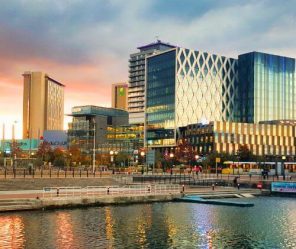Join CityClub Today to Receive:
- Priority access to exclusive off market investments
- Below market value pricing
- Out of hours investor support chat
- Allocated solicitor for hands free conveyancing
The Importance of High Yields
A good yield is often one of the most important aspects of choosing a buy-to-let property. Investing in an area that achieves high yields is far more important when an investor is looking to achieve a strong return on their investment. The best rental yields in 2023 are more likely to be found in the north of the country, in areas where rental prices are high and property prices are low.
Calculating a rental yield for a property is easy. Firstly, calculate the annual rental income of the property. Then, divide that number by the total purchase price of the property. Alternatively, use the CityRise rental yield calculator, here. The average yield of UK property right now is 3.74%, meaning any property with a higher yield is considered a high-yielding property.

Commuter Cities on the Rise
Do not underestimate commuter cities, as they are starting to increase in rental demand as the cost of living is lower for tenants. Cities such as Wakefield, Stoke-on-Trent, Burton-on-Trent, Doncaster, and Wolverhampton are seeing high levels of rental demand. This is due to their fantastic transport links to other key UK cities.
The influx of tenants in these areas is strengthening local economies, allowing them to develop a healthier social infrastructure. This gives tenants quality of life improvements, such as enhanced amenities, business hubs and leisure activities. Properties in the centre of Wakefield can yield up to 7% but typically are expected to be around the 4.4% range. For investors with smaller budgets, commuter towns and cities are fantastic investments as they can offer strong returns at a lower cost.

5.5% Yields
Birmingham
As the UK’s second city, Birmingham has large plans for regeneration. This will secure the city’s status as one of the UK’s strongest investment hotspots. The city plans to introduce over 50,000 new jobs, with the introduction of key businesses to the area. The city recently saw a further boost following a successful Commonwealth Games hosted by the city. This saw Birmingham benefit from £778 million of additional investment, excluding the revenue generated by the event.
The plans to upgrade Birmingham Curzon Street station will mean travel times to London are reduced to just 38 minutes. This will see Birmingham become one of the most viable alternatives to London. Currently, properties are available at just a fraction of the price of those found in the capital. In Birmingham, average property prices stand at just £206,000, whereas in London average property prices are over half the price, at £527,000. This opens plenty of opportunity to property investors, with Birmingham property yielding an average of 5.5%.

6.5% Yields
Leeds
The rental market in Leeds has exploded with an annual rental price rise of 11%. This had been previously forecasted, as the introduction of businesses such as Channel4 in Leeds has seen a large increase in quality tenants. The city has property available at lower prices when compared to other key UK cities, currently standing at an average of £208,000. This allows landlords to secure their assets and achieve a return on investment much sooner.
Leeds-based investments can benefit from an average yield of 6.5%, in prime postcodes, making assets in the city amongst the strongest in the UK. The South Bank project, which is currently underway, will only further strengthen the local economy. In the coming years, the city will continue to develop with upgrades to Leeds station, and the expansion of the city centre, with projects costing up to £1bn.

6% Yields
Manchester
Boasting one of the strongest local infrastructures in the UK, Manchester property offers high-yielding property. Averaging 6%, Manchester property costs an average of £219,000, however, this cost is offset by average rental prices of a massive £928pcm. To put this into context, Manchester rental prices are more than £100pcm more expensive than those found in Birmingham.
The high rental prices are due to high levels of rental demand in the city. This is because Manchester is one of the most multicultural cities in the world, with 153 languages spoken by residents. On top of this, businesses and top-tier amenities make it a growing hub for skilled professionals. Furthermore, the metro system in Manchester means property prices are more evenly distributed across the city as transport links make it easy for residents to live less centrally.

5.4% Yields
Liverpool
A thriving city of culture and business, Liverpool is forever evolving. The city’s latest changes come in the form of the Waterfront Regeneration, Knowledge Quarter, Central Park, and Anfield projects. These projects total investment of around £7bn, seeing the city attract tens of thousands of new tenants, creating new jobs and attracting more businesses.
On average, Liverpool property yields an impressive 5.4%. This is due to a supply-demand imbalance, which has raised both property prices and rental prices across the city. The average property in Liverpool currently stands at £221,000. However, the city has experienced a property price boom and is growing at up to five times the rate of London’s prices.

5.4% Yields
Sheffield
As one of Europe’s greenest cities, Sheffield’s average rental yield is currently 5.4%. Whilst average property prices currently stand at £171,000, the lowest figure on this list, the rental demand in the city is high. The average rental cost in Sheffield is £735pcm after a gargantuan 12.4% increase year on year. Property and rental prices in Sheffield are forecasted to continue growth, with the city council making large investments to sustain growth in the city.
The Heart of the City II regeneration project will complete in 2023 and see the creation of 7,000 new jobs. This is comprised of £470 million worth of developments with the aim of strengthening the local economy, whilst sustaining Sheffield’s green status. The city also aims to upgrade transport links, with the train station receiving £ 37 million of Government funding. The transport upgrades will see travel times to London decrease to just 87 minutes, making it a hotspot for commuters and further increasing the rental demand in the area.

Explore our Investment Guides
Take a look












